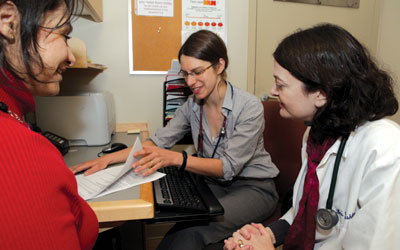Grant Supports BWH Efforts to Improve Primary Care and Teaching
|

From left, Jen Center practice assistant Beatriz Contreras Mendoza, resident Sonja Rakowski, MD, and Lori Tishler, MD, discuss patient care. |
With a looming national shortage of primary care physicians, BWH is stepping up efforts to transform the way it delivers and teaches about primary care.
The hospital plans to implement innovative approaches at three of its primary care teaching practices over the next two years, thanks to a $1 million grant from the Harvard Medical School Center for Primary Care (HMSCPC) and another $1 million in matching funds from BWH itself.
BWH's Brookside Community Health Center, Phyllis Jen Center for Primary Care and Southern Jamaica Plain Health Center will accelerate their transitions to team-based models, called patient-centered medical homes, that emphasize preventing disease, managing patients with chronic and multiple illnesses and engaging patients in improving their own health. The centers serve a diverse and medically complex population of nearly 40,000 patients, many of them living in low-income communities in Boston.
Additionally, leaders hope to improve the training experience for the residents and medical school students at these centers by actively involving them in the changes and underscoring the value of teamwork.
"The transformative aspect of this team-based model is that it's not the doctor's patient anymore. It's the team's patient," explained Vice Chair for Primary Care Joseph Frolkis, MD, PhD, principal investigator on the grant for BWH. "Building teams that include doctors, nurses, physician assistants, social workers, pharmacists, nutritionists, medical assistants and other professionals allows everyone to ‘practice at the top of their licenses.'"
Frolkis said patient and staff satisfaction has risen at health care organizations around the country that have switched to the patient-centered medical home model.
BWH is receiving the grant through a newly formed Academic Innovations Collaborative, which is providing $10 million in resources over two years to 17 local hospital-based primary care teaching practices and affiliated community health partners. The collaborative is associated with the HMS Center for Primary Care.
System in crisis
High-quality primary care has been linked to better patient outcomes, lower costs and declines in emergency department use and unnecessary hospital admissions-metrics that are becoming increasingly important under health care reform.
But several factors have contributed to a crisis in U.S. primary care: lower salaries compared to medical specialists, the often-overwhelming demands of primary care practice, and a growing population of elderly patients whose complex chronic conditions can-as a result of medicine's scientific successes-now be managed in the ambulatory setting. The Association of American Medical Colleges predicts a shortage of about 63,000 primary care doctors by 2015, with greater shortfalls on the horizon.
Frolkis, however, sees evidence of a renewed interest in primary care among medical students and residents. He is optimistic that, with the changes supported by the grant, the roughly 90 trainees at the three teaching clinics will experience the strengths of primary care, including long-term relationships with patients that promote prevention, patient-driven and culturally sensitive treatment goals, and the satisfaction and ongoing learning inherent in working with colleagues from other disciplines.
"Many specialty practices are recognizing the advantages of team-based care, so even those trainees who eventually pursue specialty training will benefit from exposure to a high-functioning primary care team," Frolkis noted. "This will also prepare them to be better colleagues in the critical work of care coordination that organizations like the Brigham will have to master in the new world of health care."
The Jen Center, which serves roughly 17,000 adult patients (many from the surrounding neighborhood), plans to use its grant to improve care of chronic diseases, among other goals. In the case of diabetes, this might include multidisciplinary teams, computerized registries to track care, health coaches and home blood-sugar monitoring devices.
"We are excited about the opportunities to move forward with the added resources," said Lori Tishler, MD, medical director. "We already provide team-based care for some of our most challenging patients through the Jen Center ICU," referring to a virtual unit for patients who need extra care for specific urgent or chronic medical problems.
The center will expand that model throughout the practice so each patient knows he or she belongs to a team of concerned providers. "We also look forward to helping our residents experience the rewards of sharing care with team members," Tishler added. "We hope to see real change at the end of the two-year grant period."
David Bates, MD, is one of three co-interim directors of the HMSCPC and BWH's chief quality officer. "If the U.S. is to have higher quality care at lower costs, primary care models will have to change, and this initiative provides the local grantees the chance to innovate solutions," he said.